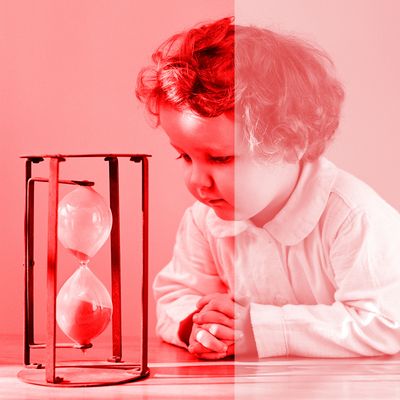
This week, Science of Us is exploring time: what makes it feel like it’s speeding up or slowing down, how we learn to tell the difference, and how we can learn to control it either way.
Here’s what I learned right after becoming a mom: For the first few months with a new baby, time as you previously knew it ceases to exist. The first days of my baby’s life blurred together in a steady gallop of feeding, changing diapers, and grabbing sleep whenever I could.
But if you’re lucky, around the same time the baby is starting to smile and roll over, life will begin to settle into some semblance of a rhythm. Things like naps and feeding times become more defined, and nighttime stretches of sleep get (slightly) longer each day. Eventually, I found myself measuring time in days again, rather than the number of diapers filled or ounces of milk ingested.
Believe me, I was grateful for it. But I was also curious: Why now? What had changed?
In all likelihood, it was because my baby was finally developing a primitive sense of time. Research suggests this typically happens by the time kids hit the one-month mark: In one 1972 study, researchers placed month-old infants in a dark room where the light was switched on every 20 seconds. When they repeated the experiments without switching on the lights, they found that the babies’ pupils still constricted every 20 seconds in anticipation of the light change. Baby brains, the authors concluded, are primed to recognize “a given temporal interval between two events” very soon after birth.
Over the first year of life, their sense of time becomes more finely tuned: A study published in 2010 in the journal Developmental Science showed that babies between 6 and 10 months could differentiate between different periods of time. The study authors showed their tiny volunteers an object that would appear every two seconds . After a while, the researchers switched up the pace and showed the babies the same object in four-second intervals instead – and the babies took notice. The scientists noted an increase in the babies’ looking time when the intervals were changed, suggesting that they could recognize a difference between two seconds and fours seconds.
Perhaps not surprisingly, time perception strengthens as kids grow. Although babies can tell the difference between two seconds and four seconds, or a 1:2 ratio, research has shown that the same can’t be said for a time ratio of 2:3 (a difference, for instance, of 10 seconds and 15 seconds). For some reason, that ability doesn’t kick in until much later, sometime between age 8 and adulthood.
In other words, human brains are clearly primed to recognize time, developing that sense over the years like a muscle that can be strengthened — but it’s not a totally linear process. Interestingly, scientists have noted that around the age of 3 or 4, children start to make errors in temporal judgments, such as thinking that red cars travel faster, or that bright lights shine for longer.
So why, after so much progress, would a kid’s sense of time seemingly go off the rails for a while during toddlerhood? Some researchers believe it’s because children around that age are moving from an implicit judgement of time (like anticipation of an upcoming stimulus) to an explicit one (an estimate of duration). For example, if I popped a fruit snack in my four-year-old’s mouth every five seconds, he would easily start anticipating fruit snacks in five-second intervals – and he’d notice if it took me longer than five seconds to feed him. But if I asked him to “wait two minutes” before I opened another box of fruit snacks, he would likely struggle with estimating how long “two minutes” really is. This, scientists say, is because explicit temporal judgements rely on neural pathways in the brain that aren’t yet developed. These concepts typically don’t start to solidify until around age 7 or 8.
Which means that as a kid moves from the blank slate of infancy toward a fully developed sense of time, things might get a little tough on the parents. Sure, it was a relief to get my son onto a regular schedule of eating and sleeping, but he’s now dangerously close to the age when kids love asking are we there yet?! over and over on car trips. I’m just going to have to remember to breathe: His brain is just developing right on schedule.




